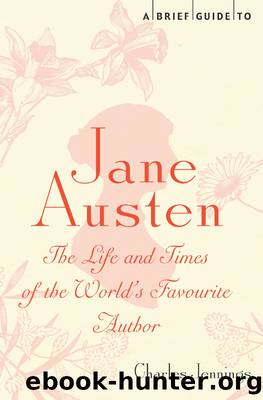A Brief Guide to Jane Austen by Charles Jennings

Author:Charles Jennings
Language: eng
Format: epub
ISBN: 9781780330471
Publisher: Little, Brown Book Group
Persuasion
Persuasion is a novel that tends to attract one-word epithets, as if this final novel in Jane Austenâs career is particularly susceptible to being summed up in one conclusive term. For many readers, it is âautumnalâ; for others, âmellowâ; âbitterâ and âworldlyâ are terms that also crop up. Hedged about by the circumstances of its composition and publication, it is a novel that puzzles almost as much as Mansfield Park â but without any Emma waiting to make good the puzzlement, to redeem the doubt. âPuzzlingâ might well be another handy adjective.
Jane Austen began Persuasion in 1815, straight after finishing Emma; but she was already ill, slowly declining towards death. Why is Persuasion her shortest book? Not least because she didnât have the time to write a longer one. Also, one suspects, because Emma had exhausted her, had been her defining work, and had left her with not much more to say on the subject of young people, feisty heroines, romantic misunderstandings and hard-won realizations. She also wanted to say something about a slightly older generation, something closer to herself â nearly forty years old â not an Emma, but a spinster in a quiet way of life. It is, in fact, a signal problem with Persuasion that it is so difficult to read without seeing Jane herself throughout the book. There is a sense of leave-taking about it that may have nothing much to do with the novel itself and everything to do with what we know of Miss Austen: in pain, weary, never finding the time for a final revision of the text, never definitively naming it â Persuasion being tacked on after her death by brother Henry.
The Elliot daughters, Elizabeth and Anne, could indeed both do duty as Austen surrogates â Elizabeth, the older, standing in for Cassandra, with Anne taking the place of Jane (both Jane and Anne, of course, capable pianists). The difference being that while Jane and Cassandra give the impression of being indivisible, two parts of the same entity, the Elliots are carefully rendered as distinct beings. Elizabeth, the older at twenty-nine, may be staring disappointment anxiously in the face (âShe felt her approach to the years of danger, and would have rejoiced to be certain of being properly solicited by baronet blood within the next twelvemonth or twoâ), but she still has her looks and her bearing, as we can tell from Austenâs quietly condescending âIt sometimes happens, that a woman is handsomer at twenty-nine than she was ten years before . . . It was so with Elizabeth.â
Anne, conversely, is a lost cause. âA few years before, Anne Elliot had been a very pretty girl, but her bloom had vanished earlyâ; now, âShe was faded and thinâ, and, despite possessing âElegance of mind and sweetness of characterâ, is âNobody with either father or sister: her word had no weight; her convenience was always to give way â she was only Anne.â Her destiny is always to submit to wayward ambitions of
Download
This site does not store any files on its server. We only index and link to content provided by other sites. Please contact the content providers to delete copyright contents if any and email us, we'll remove relevant links or contents immediately.
The Power of Myth by Joseph Campbell & Bill Moyers(1068)
Half Moon Bay by Jonathan Kellerman & Jesse Kellerman(987)
A Social History of the Media by Peter Burke & Peter Burke(987)
Inseparable by Emma Donoghue(983)
The Nets of Modernism: Henry James, Virginia Woolf, James Joyce, and Sigmund Freud by Maud Ellmann(913)
The Spike by Mark Humphries;(812)
The Complete Correspondence 1928-1940 by Theodor W. Adorno & Walter Benjamin(789)
A Theory of Narrative Drawing by Simon Grennan(782)
Culture by Terry Eagleton(776)
Ideology by Eagleton Terry;(743)
World Philology by(719)
Farnsworth's Classical English Rhetoric by Ward Farnsworth(715)
Game of Thrones and Philosophy by William Irwin(712)
Bodies from the Library 3 by Tony Medawar(709)
High Albania by M. Edith Durham(705)
Adam Smith by Jonathan Conlin(695)
A Reader’s Companion to J. D. Salinger’s The Catcher in the Rye by Peter Beidler(688)
Monkey King by Wu Cheng'en(654)
Comic Genius: Portraits of Funny People by(652)
